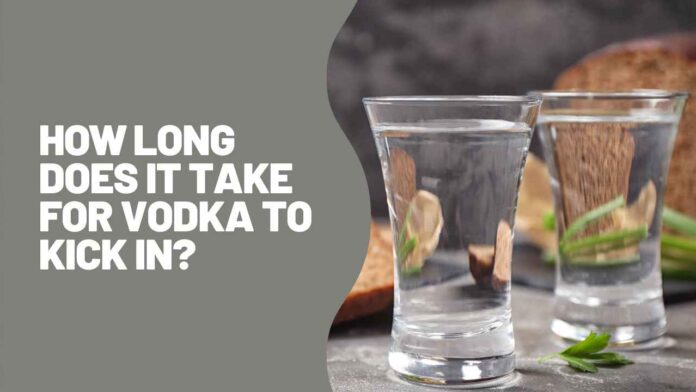This page may contain affiliate links. Please see our Disclaimer for more information. Always drink responsibly and adhere to your local legal drinking age.
Introduction
Have you ever wondered how long it takes for vodka to kick in after sipping a delicious cocktail? The answer is essential, especially when planning a night out or aiming to pace yourself while enjoying your favorite libation.
Vodka, like other forms of alcohol, can impact people differently depending on various factors such as body weight, metabolism rate, and food intake.
This blog post’ll explore the fascinating science behind alcohol absorption and its effects on our bodies – from the first delightful sip to potential long-term consequences.
Key Takeaways:
- The time it takes for vodka to kick in depends on various factors, including alcohol content, body weight, drink composition, and food intake.
- Drinking slowly, alternating between alcoholic beverages and water, and eating before drinking can help control alcohol absorption and pace yourself.
- Vodka can induce euphoria, relaxation, impaired judgment, and reduced inhibitions due to its effects on the central nervous system. However, excessive consumption can lead to severe short-term and long-term consequences such as addiction and health problems.
- Always practice safe drinking habits by following moderate consumption guidelines and avoiding mixing with other substances. Drink responsibly!
Understanding Alcohol Absorption And Metabolism
Alcohol is absorbed into the body through the stomach lining and small intestine, with higher alcohol concentrations absorbed faster.
How Alcohol Is Absorbed In The Body
As soon as you sip your favorite vodka-based cocktail, the alcohol absorption process begins. Unlike most substances, alcohol does not require digestion and gets absorbed directly into your bloodstream through the stomach lining and small intestine.
The speed at which alcohol enters your system can be influenced by various factors, such as how quickly you drink, whether or not you’ve eaten beforehand, and how much body water and fat content you have.
For instance, if you’re enjoying a Cosmopolitan on an empty stomach before dinner, the vodka will likely kick in faster compared to sipping on a Screwdriver with a full meal.
Factors That Influence Absorption Rate
Several factors can influence the rate of alcohol absorption, which ultimately affects how quickly a person may feel the effects of vodka. This is especially important for cocktail drinkers to be aware of when enjoying their favorite beverages. Factors that influence absorption rate include:
- Biological sex: Typically, women absorb alcohol more quickly than men due to physiological differences, such as having less body water and higher body fat percentages.
- Alcohol content: Drinks with higher alcohol content, like vodka, are absorbed faster into the bloodstream than beverages with lower concentrations.
- Body weight: A person’s weight significantly determines how fast alcohol is absorbed and metabolized.
- Food intake: Drinking on an empty stomach results in quicker absorption of alcohol, whereas having food in your stomach can slow down this process.
- Drink composition: The presence of carbonation or the mixers used in cocktails can affect the speed of alcohol absorption.
- Hydration levels: Dehydration can slow down metabolism and increase intoxication levels, making it essential to drink water alongside alcoholic beverages.
- Medications or other substances: Some medications or drugs may interfere with alcohol metabolism or intensify its effects on the nervous system.
- Tolerance level: Regular drinkers often develop tolerance to alcohol’s effects, meaning they might not feel intoxicated as quickly as less frequent consumers would.
By acknowledging these factors and adjusting consumption habits accordingly, cocktail drinkers can better manage their experience with vodka and ensure a safer and more enjoyable time out or at home.
Alcohol Content Of Vodka
Cocktail drinkers often appreciate vodka for its versatility and ability to blend well with various mixers. One important aspect to consider when consuming vodka is its alcohol content, which significantly influences how the body absorbs and processes it.
Most vodkas on the market have an ABV of around 40%, meaning that 40% of the liquid in your glass consists of pure alcohol. This potency makes vodka one of the higher-alcohol-content spirits than other drinks like beer or wine, which typically have lower ABVs.
For example, a shot of vodka (approximately 1.5 ounces) would contain roughly 0.6 ounces of pure alcohol – significantly more than you’d find in a standard serving size of beer or wine.
Body Weight And Metabolism
The amount of alcohol a person can process depends on their body weight and metabolism. People with larger bodies generally have more water content, which means they may be able to tolerate more alcohol than those with smaller bodies.
This is because water helps dilute the effects of alcohol in the bloodstream. Additionally, a person’s metabolic rate is crucial in determining how quickly their body can get rid of the alcohol they consume.
Those with faster metabolisms will break down alcohol quicker, whereas people with slower metabolisms will take longer to process the same amount of alcohol.
Drink Composition And Food Intake
The composition of your drink and what you eat before or during drinking can significantly impact how quickly vodka kicks in. A mixed drink that contains other ingredients besides pure alcohol, like juice or soda, may take longer to be absorbed by the body compared to shots of pure vodka.
Additionally, consuming food while drinking slows the absorption rate because the stomach needs more time to break down both the food and the alcohol. On the other hand, drinking on an empty stomach increases absorption rates because there’s less food in your system for alcohol to compete with for absorption.
It is essential to remember that eating before or during drinking can also increase metabolism, speeding up how fast your body processes alcohol.
How Long Does It Take For Vodka To Kick In?
Alcohol’s effects are typically felt within about 10-30 minutes. Still, the time it takes for vodka to kick in depends on factors such as alcohol content, body weight, drink composition, and food intake.
Typical Onset Times For Different Levels Of Alcohol Consumption
Knowing how long it takes for vodka to kick in can help you pace your drinks responsibly. The table below illustrates the typical onset times for different levels of alcohol consumption, including vodka.
| Type of Drink | Amount | Approximate Onset Time |
|---|---|---|
| Shot of Vodka | 1.5 ounces (44 ml) | 1 hour |
| Pint of Beer | 16 ounces (473 ml) | 2 hours |
| Large Glass of Wine | 6 ounces (177 ml) | 3 hours |
Remember that these times are approximate and can vary depending on individual factors such as body weight, metabolism, and the presence of food in the stomach. Remember that alcohol reaches the brain within 5 minutes and starts affecting the body within 10 minutes, so it’s essential to be mindful of your consumption. Always drink responsibly and enjoy your vodka in moderation.
Variations Based On Individual Factors
There are a variety of individual factors that can influence the amount of time it takes for vodka to kick in. For example, body weight and metabolism can play a big role.
Those with more body fat tend to feel the effects of alcohol slower than those with less body fat because fat doesn’t absorb alcohol as readily as other tissues do.
Other factors affecting how long it takes for vodka to kick in include drink composition and food intake. A cocktail containing high amounts of sugar or other mixers could slow down the absorption rate of pure alcohol present in the vodka.
It’s important for anyone consuming alcohol (including cocktails made with vodka) to be mindful of their tolerances and limits when it comes to intoxication levels – especially given potential health risks associated with excessive drinking behaviors such as injuries resulting from impaired judgment, liver diseases from heavy consumption over time, and even cancer diagnoses related specifically back towards certain types or patterns observed throughout periods using alcoholic beverages at varying quantities across different segments within society (e.g., binge drinkers).
How To Control Alcohol Absorption And Pace Yourself
Pacing yourself while drinking can help you enjoy your vodka without experiencing the negative side effects of excessive alcohol consumption. Here are a few tips to help you control alcohol absorption and pace yourself:
- Drink slowly: Sipping your vodka slowly rather than gulping it down will reduce the speed of alcohol entering your bloodstream.
- Alternate between alcoholic drinks and water: Drinking water in between alcoholic beverages can slow down the absorption of alcohol, keeping you hydrated and reducing the risk of a hangover.
- Eat before drinking: Consuming food before having your vodka can also slow the rate at which alcohol is absorbed into your bloodstream.
- Stick to one type of drink: Switching from one type of alcoholic beverage to another can make it difficult to track how much you’ve had. Sticking to one type of drink, such as vodka, makes it easier to monitor your intake.
- Watch your pour size: Controlling how much vodka you consume is essential. Keep an eye on how much you’re pouring, and limit yourself to just one or two standard drinks per occasion.
Remember that everyone’s body processes alcohol differently, so what works for one person may not be suitable for someone else. Practice safe drinking by following these tips and always knowing when to stop drinking to avoid negative consequences of excessive consumption.
The Short-term Effects Of Vodka
Vodka can induce euphoria, relaxation, impaired judgment, and reduced inhibitions due to its effects on the central nervous system.
Euphoria And Relaxation
After consuming vodka, many people experience pleasurable euphoria and relaxation. The depressant effects of alcohol can lead to a sense of calmness, decreased anxiety, and an overall feeling of well-being.
This is because alcohol affects the brain’s neurotransmitters, which are chemicals that transmit signals between nerve cells. However, it’s worth noting that these short-term effects vary depending on the person’s blood alcohol concentration levels.
For example, someone who drinks more may feel these effects more intensely than someone with less to drink.
Impaired Judgement And Reduced Inhibitions
Drinking vodka can impair judgment and reduce inhibitions, which can have serious consequences. When under the influence of alcohol, you may be unable to make rational decisions or think clearly, leading to risky behaviors and regrettable actions.
For example, drinking too much vodka at a social gathering could result in saying something hurtful or offensive to a friend without realizing it until later. Additionally, getting behind the wheel after having several shots of vodka is extremely dangerous and illegal, as alcohol impairs reaction time and physical coordination.
Alcohol’s Effects On The Central Nervous System
Alcohol significantly impacts the central nervous system, affecting neurotransmitters, brain cells, and neural pathways. Alcohol is a depressant drug that slows down the messages sent between brain and spinal cord nerve cells.
As alcohol consumption increases, so does its effect on the body’s CNS. Heavy drinking can lead to blackouts (memory loss), dizziness or vertigo depending on movement changes (ataxia), difficulty with concentration/memory recall/hand-eye coordination/attention span/judgment calls/impaired decision-making/emotional lability/agitation/depression or anxiety.
It’s essential always to consume moderate amounts while avoiding mixing it with other substances for safe consumption habits without negatively impacting your long-term CNS function.
The Long-term Effects Of Vodka
Drinking vodka in excess over a prolonged period can lead to addiction and dependence, as well as liver damage, cardiovascular problems, and mental health issues.
Addiction And Dependence
Regular and excessive consumption of alcohol, including vodka, can lead to addiction and dependence. Addiction is a chronic brain disorder characterized by compulsive drug use despite harmful consequences, while dependence is when the body craves a substance to function normally.
Alcohol addiction or alcoholism often develops gradually over time as people drink more regularly and in larger amounts.
Misuse affects many aspects of life for those who develop an addiction, from physical health issues such as liver disease and inflammation of the stomach lining to mental health disorders like depression or anxiety.
Alcohol abuse can also have social implications, such as job loss, divorce, or legal problems due to drunk driving accidents.
Liver Damage
Excessive and long-term consumption of vodka can lead to liver damage. The liver is responsible for breaking down alcohol in the body, but when it’s overloaded with more than it can handle, it accumulates fatty deposits and becomes inflamed.
This condition is alcoholic hepatitis and may eventually progress to cirrhosis if left untreated. It’s worth noting that not everyone who consumes large amounts of alcohol will develop significant liver damage.
However, over time, heavy drinking increases the risk of developing serious health problems such as liver disease or cancer. Therefore, moderation is key to enjoying a few drinks without risking your health.
Cardiovascular Complications
Long-term heavy drinking, including vodka, can lead to serious cardiovascular complications. Excessive alcohol intake has been linked to high blood pressure, heart disease, and cardiomyopathy – a condition where the heart muscle is damaged and cannot work efficiently.
Alcohol-induced cardiomyopathy is caused by drinking too much and can lead to shortness of breath, swelling in the legs, and fatigue. Research shows that even short-term excessive alcohol consumption can have negative effects on the heart and circulatory system.
Mental Health Problems
Excessive alcohol consumption, including vodka, can significantly impact mental health. Alcohol alone can cause depression and anxiety by constantly driving the brain into an aversive state.
Moreover, long-term excessive alcohol use can lead to chronic mental health issues such as depression and anxiety disorders. Studies have also shown that prolonged heavy drinking may lead to cognitive decline and memory loss later in life.
Therefore, cocktail drinkers need to be mindful of their alcohol consumption and seek professional help if they notice any signs of addiction or other mental health issues caused by drinking too much.
Safe Drinking Guidelines For Vodka
Drink vodka in moderation and pace yourself. Remember to drink water between drinks and avoid mixing it with other substances. If you’re drinking, have a full stomach before consuming any alcohol.
Moderate Consumption
When it comes to vodka, moderation is key. To enjoy the effects of alcohol without putting your health at risk, aim for no more than one standard drink per hour or up to three drinks in a single day for women and four drinks for men.
To stay within safe drinking guidelines, it’s essential to consider factors such as body weight and food consumption. Drinking on an empty stomach can result in faster absorption and increased intoxication levels.
Additionally, alternating alcoholic beverages with water can help you pace yourself while staying hydrated throughout the night.
Drinking Water In Between Drinks
Staying hydrated is key when drinking alcohol. Drinking water in between alcoholic beverages can help slow the absorption of alcohol and prevent dehydration. Here are some tips for staying hydrated while enjoying your cocktails:
- Drink a glass of water before you start drinking alcoholic beverages.
- Alternate between alcoholic drinks and glasses of water throughout the night.
- Use a reusable water bottle to ensure you always have water access.
- Choose drinks with lower alcohol content or mixers with more water, such as soda or tonic water.
- Avoid sugary mixers that can dehydrate you even more.
Remember, drinking responsibly means monitoring how much you drink and how much water you consume. Doing so will help reduce the severity of hangovers and minimize potential health risks associated with excessive drinking.
Avoiding Mixing With Other Substances
It’s important to remember that alcohol is a substance that should be enjoyed responsibly. Mixing alcohol with other substances, such as energy drinks, prescription drugs, or illicit drugs, can have serious consequences.
For example, mixing alcohol with energy drinks can increase heart rate and blood pressure, which can be dangerous for those with underlying heart conditions.
Additionally, when drinking prescription or illicit drugs, the effects of both substances can amplify and cause negative side effects.
According to [IMPORTANT FACTS], drinking plenty of water and avoiding mixing sugary or energy drinks while drinking can help contribute to safer drinking habits. It’s also important to remember that time is the only thing that can remove alcohol from our system, averaging about an hour per standard drink.
So if you do choose to drink, make sure you plan for safe transportation and never hesitate to seek medical attention if necessary.
Drinking On A Full Stomach
Drinking on a full stomach is one way to help control alcohol absorption and pace yourself. When you have food in your stomach, it slows the passage of alcohol from the stomach into the small intestine, where most of the alcohol is absorbed into the bloodstream.
This means that if you drink alcohol after eating a meal, it will take longer to feel its effects.
However, it’s important to note that moderation is key, even when drinking on a full stomach. Your body still needs time to process the alcohol before it leaves your system, so be sure to pace yourself and limit your overall consumption.
What To Do If You’ve Had Too Much Vodka
Recognize signs of alcohol poisoning, such as vomiting, confusion, and difficulty breathing.
Recognizing Signs Of Alcohol Poisoning
Alcohol poisoning can be dangerous and even deadly, so knowing how to recognize the signs is important. Here are some symptoms to look out for:
- Confusion or disorientation
- Vomiting or retching
- Slow or irregular breathing
- Blue skin or pale skin
- Low body temperature or hypothermia
- Seizures or convulsions
If you see any signs in someone who has been drinking, it’s crucial to seek medical attention immediately. Don’t wait for all the symptoms to appear before taking action. Alcohol poisoning can progress quickly, and time is of the essence.
Remember that alcohol affects everyone differently, and people may exhibit different symptoms depending on weight, gender, and age. It’s always better to err on the side of caution when dealing with alcohol-related issues.
To prevent alcohol poisoning in yourself and others, keep an eye on your drinking habits, pace yourself when consuming alcohol, hydrate between drinks with water or non-alcoholic beverages, and avoid mixing alcohol with other substances. And if you suspect that you or someone you know may have consumed too much alcohol, don’t hesitate to seek help immediately.
Seeking Medical Attention If Necessary
It’s essential to know when to seek medical attention if you or someone you know has had too much vodka. Alcohol poisoning is a severe condition that can affect breathing, heart rate, and body temperature and lead to a coma in extreme cases.
The symptoms of alcohol poisoning include confusion, vomiting, seizures, slow or irregular breathing, blue or pale skin, and unconsciousness. If any of these symptoms are present after drinking vodka excessively, immediate medical attention should be sought.
Plan Ahead For Safe Transportation
It is essential to plan for safe transportation when drinking vodka. Impaired driving can have significant consequences, including DUI charges, license suspension/revocation, fines, and even imprisonment.
To avoid these negative outcomes, consider arranging a designated driver or alternative means of transport before indulging in alcoholic beverages. If you cannot find someone to drive you home safely or think that your level of intoxication may be too high, use ride-sharing services such as Uber or Lyft instead.
Also worth noting is that impaired driving can lead to severe injury or death – not just for yourself but potentially anyone else on the road with you.In fact, over 10,000 Americans die each year from drunk driving crashes alone, according to NHTSA data.
FAQ
Q: How long does it take for alcohol to kick in?
A: The time it takes for alcohol to kick in varies from person to person and depends on several factors, such as the type of alcohol, amount consumed, body weight, and metabolism. Generally, alcohol takes effect within 10-30 minutes of consumption.
Q: How long does it take for vodka to kick in?
A: Vodka is a type of alcohol, and its effects kick in within the same range of time as any other type of alcohol. It usually takes about 10 to 30 minutes for vodka to take effect. Still, it may vary depending on several factors, such as alcohol tolerance, the amount consumed, and the concentration of alcohol in the drink.
Q: Does the amount of alcohol affect how quickly it kicks in?
A: Yes, the amount of alcohol consumed can affect how quickly it kicks in. The more alcohol you consume, the longer it will take for your body to metabolize it. This means that the effects may take longer to kick in and may also last longer.
Q: Can mixing different types of alcohol affect how quickly it kicks in?
A: Yes, mixing different types of alcohol can affect how quickly it kicks in. When you mix alcohol, your body must work harder to metabolize it, so the effects may take longer. Additionally, mixing different types of alcohol can increase the likelihood of experiencing negative side effects, such as nausea and vomiting.
Q: How does the concentration of alcohol in the drink affect how quickly it kicks in?
A: The concentration of alcohol in the drink can affect how quickly it kicks in. The higher the alcohol by volume (ABV), the quicker the effects may be felt. However, this also means that the effects may be more intense, and the risk of experiencing negative side effects may increase.
Q: Does diluting alcohol affect how quickly it kicks in?
A: Diluting alcohol can affect how quickly it kicks in. When you dilute alcohol, the concentration of alcohol in the drink decreases, which means it may take longer for the effects to kick in. However, diluting alcohol can also decrease the intensity of the effects and reduce the risk of negative side effects.
Q: How long does it take for one shot of vodka to kick in?
A: It usually takes about 10 to 30 minutes for one shot of vodka to kick in, but it may vary depending on several factors such as alcohol tolerance, amount consumed, and the concentration of alcohol in the drink. Additionally, the effects may last for several hours after consumption.
Q: How does the stomach and small intestine affect how quickly alcohol kicks in?
A: When you consume alcohol, it is absorbed into your bloodstream through the lining of your stomach and small intestine. The rate at which this occurs can affect how quickly alcohol kicks in. Eating food before drinking can slow down the absorption rate, which may take longer for the effects to kick in.
Q: How does alcohol affect the liver?
A: After alcohol is absorbed into the bloodstream, it travels to the liver to metabolize it. The liver can only process a certain amount of alcohol at a time, so the more you drink, the longer it will take for your body to metabolize it. Excessive alcohol consumption can also damage the liver over time and increase the risk of developing liver disease.
Q: Can dependence on alcohol affect how quickly it kicks in?
A: Yes, alcohol dependence can affect how quickly it kicks in. Chronic alcohol use can lead to increased tolerance, meaning it may take more alcohol to feel the effects. However, this can also increase the risk of developing alcohol use disorder and experiencing negative side effects.
Conclusion: Enjoy Vodka Responsibly
In conclusion, vodka can kick in quickly, and the effects of alcohol vary depending on various individual factors such as body weight, metabolism, drink composition, and food intake.
It usually takes about 30 minutes to an hour for alcohol to take effect on average. However, it’s important to remember that drinking too much or mixing with other substances can have severe short-term and long-term consequences, such as addiction, liver damage, cardiovascular complications, and mental health problems.





















